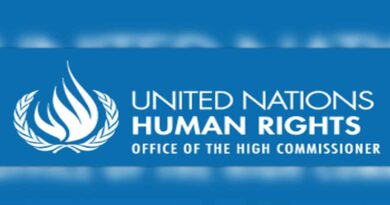To “Build Back Better” World Must End Slavery for All, Including Women and Children ̶ UN Experts
(Special Correspondent)
GENEVA (1 December 2021) – The effects of current global challenges such as the COVID-19 pandemic, economic crisis, climate change and armed conflict are pushing an increased number of people into contemporary forms of slavery. The situation of women and children is of particular concern, UN human rights experts* say in this statement issued on the occasion of the International Day for the Abolition of Slavery:
“According to figures released by UNICEF and ILO in June, almost 80 million children aged 5 to 17 years are subjected to hazardous work which is a contemporary form of slavery. And as a result of the economic recession and school closures caused by COVID-19, children may be working longer hours or under worsening conditions, while many others may have been forced into the worst forms of child labour due to job and income losses among their families. Forced recruitment of children into armed and criminal groups continues both in emergency and non-emergency settings.
Women and children bear the brunt of crises caused by the COVID-19 pandemic, climate change and humanitarian emergencies. As a result, they face a particularly high risk of being pushed into slavery. As many become displaced or migrate in the fight for survival, the risk of becoming trapped into forced labour or sexual exploitation increases exponentially. They face retaliation in the form of brutal punishment and even death if they try to escape and/or denounce their situation.
According to unofficial estimates, one in every 130 women and girls is subjected to contemporary forms of slavery such as child and forced marriage, domestic servitude, forced labour and debt bondage which entail highly gendered experiences. High levels of exploitation also prevail in global supply chains which – based on existing business models – often rely on and reinforce labour exploitation and deepen gender inequality.
While gender inequalities lie at the heart of contemporary forms of slavery, these practices are also fuelled by intersecting forms of discrimination, oppression and inequalities based on race, ethnic origin, caste, social and economic status, age, disability, sexual orientation, gender identity and migration status. Indigenous peoples are disproportionally affected by forced and bonded labour.
To prevent exploitation which may amount to contemporary forms of slavery, we urge States to establish safe migration pathways, to facilitate access to decent work in cooperation with the business sector, civil society organisations as well as trade unions, to strengthen efforts to tackle inequality and discrimination on various grounds and to ensure the protection of the most vulnerable, including children. Additionally, human rights defenders and civil society organizations working to end contemporary forms of slavery should be able to carry out their work in a safe and enabling environment. Also, accountability of perpetrators of contemporary forms of slavery must be strengthened as a matter of priority, as currently impunity prevails in far too many instances.
Tangible action in these areas should be part of building back better at the national and global level as we emerge from the COVID-19 pandemic. Slavery in all its forms needs to end for everyone, including women and children in contexts of armed conflict. Slavery is a disgrace to humanity which in the 21st century cannot be tolerated.
This year marks the 30th anniversary of the UN Voluntary Trust Fund on Contemporary Forms of Slavery. This year alone, 18,000 victims received vital assistance from organizations financially supported by the Fund. On the International Day for the Abolition of Slavery, we appeal to all Member States to increase their contribution to the Fund, or to make one for the first time.”




